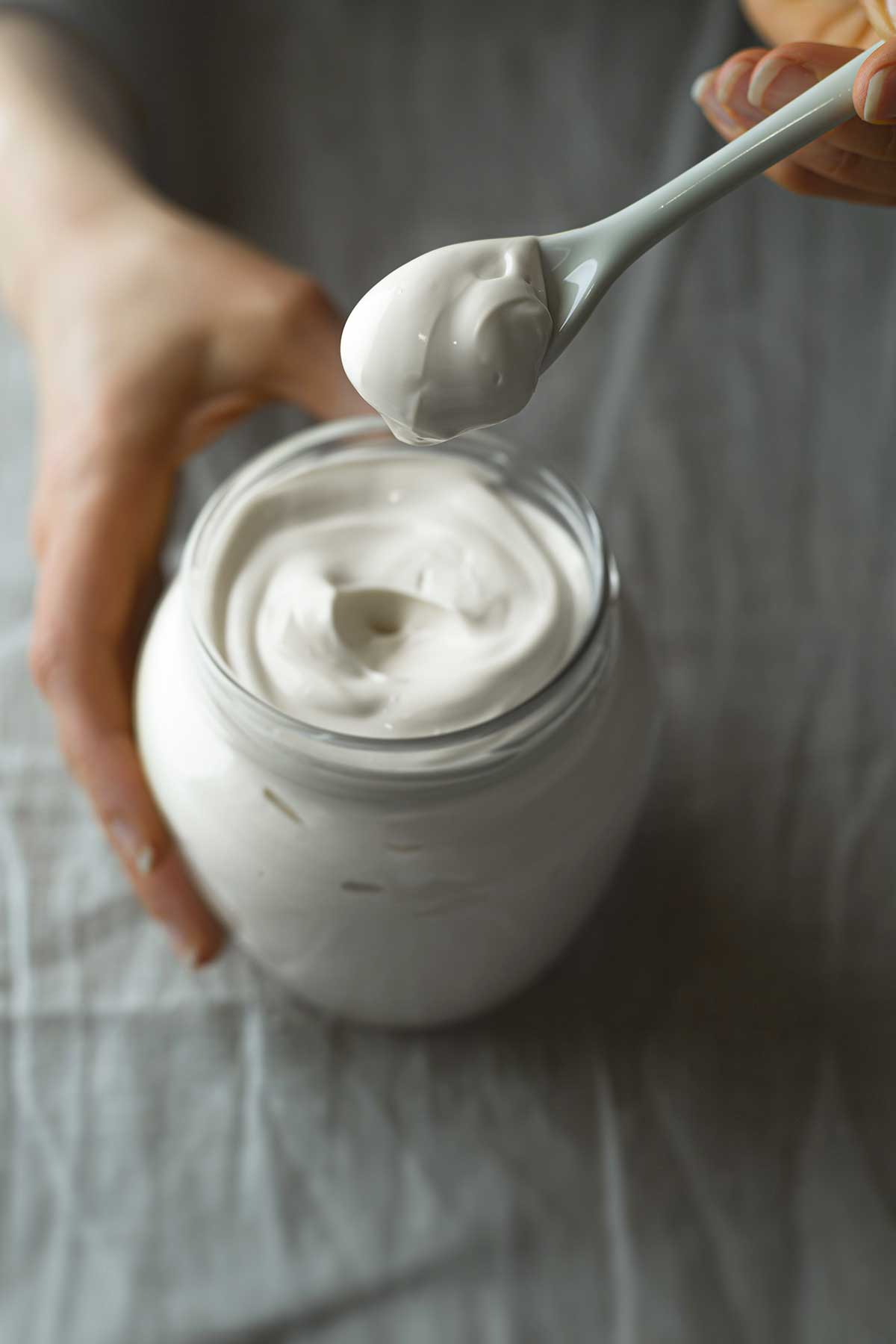
This is one of those recipes that require quotation marks, not out of affectation, but because it’s not a true mayonnaise. It contains no egg yolks or mustard. It’s nothing more than an emulsion of milk and oil. More Brazilian than Portuguese, it’s just now beginning to be used on the Continent. The taste is lighter and cleaner than that of egg-based mayonnaise, allowing other flavors to come through.
☞ Read the Article: The Secret Behind Milk Mayonnaise
Since I was given the recipe, I haven’t stopped finding ways to cook with it. The master recipe is only a canvas for additions. Besides the uses in this book, I’ve smeared the variations on grilled meats and fish, used them as dips and in dressings, spread them on sandwiches, and stirred them into potato salads, much as I do with actual mayonnaise.
Why Isn’t my Mayonnaise Emulsifying?
Like all emulsions, this recipe can be a bit finicky. But adding the oil in a thin stream and stopping when the right consistency is reached is the key. For almost foolproof results, a handheld blender is best, but a small canister blender with a narrow base will do (tall and narrow is best here). Don’t do as some of us did and assume that a stand mixer or food processor will work—it just won’t. If you’re working with a less-than-powerful immersion blender, the consistency of the mayonnaise may turn out thinner than you’d expect. You can help it along by slowly adding 2 more tablespoons of oil to the milk mayonnaise as you continue to blend and it will thicken nicely.
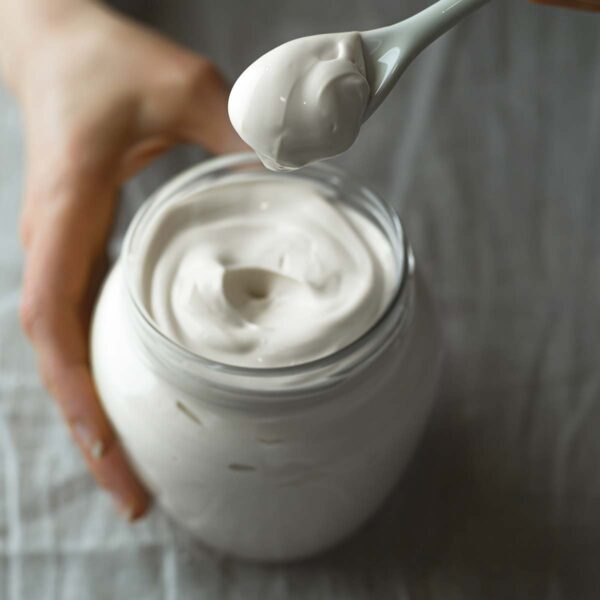
Milk Mayonnaise
Ingredients
- ⅓ cup very cold milk
- ¾ teaspoon fresh lemon juice
- 1 small garlic clove, peeled
- ⅛ teaspoon white pepper
- About ¾ cup vegetable oil, or 1/2 cup (118 ml) vegetable oil plus 1/4 cup (60 ml) olive oil
- Kosher salt
Instructions
- Combine the milk, lemon juice, garlic, and pepper in a 2-cup glass measuring cup. Using a handheld blender (or a blender), buzz on high for 30 seconds until frothy.
- With the motor running on high, slowly pour in the oil a few drops at a time, and gradually increase this to a fine thread, moving the blender up and down, until the mixture thickens lusciously and resembles a soft mayonnaise. You may need more or less oil.
- Season with salt to taste. The mayonnaise will last up to 1 week in the fridge.
Notes
Milk mayonnaise variations
Clockwise from top right: cilantro-ginger, curry, anchovy, sun-dried tomato.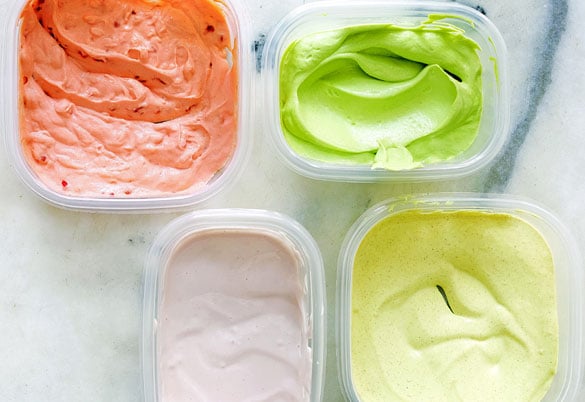
Cilantro and Ginger Milk Mayonnaise | Maionese de Leite com Coentros e Gengibre
Add 1 loosely packed cup of well-dried fresh cilantro leaves and tendril-soft stems and a 1 1/2-inch peeled and grated thumb of ginger to the cup along with the milk, 1 3/4 teaspoons of lemon juice, and the pepper. Omit the garlic. Whir in the oil as directed above. Stir in 1 scallion cut into thin slices on the diagonal.Anchovy Milk Mayonnaise | Maionese de Leite com Anchovas
Add 6 anchovy fillets (generous 1 tablespoon) packed in oil to the cup along with the milk, lemon juice, garlic, and pepper. Whir in the oil as directed above. Omit the salt.Curry Milk Mayonnaise | Maionese de Leite com Caril
Add 2 teaspoons of your favorite curry powder to the cup along with the milk, lemon juice, garlic, and pepper. Whir in the oil as directed above. Before using, let this sit for an hour or so in the fridge to bloom.Tomato Milk Mayonnaise | Maionese de Leite com Tomate
Add 1 1/2 tablespoons of double-concentrate tomato paste to the cup along with the milk, garlic, and pepper. Omit the lemon juice. Whir in the oil as directed above. Stir in 1 tablespoon minced oil-packed sun-dried tomatoes.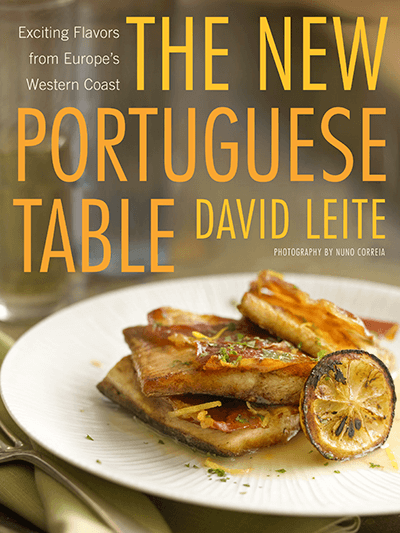
Nutrition
Nutrition information is automatically calculated, so should only be used as an approximation.
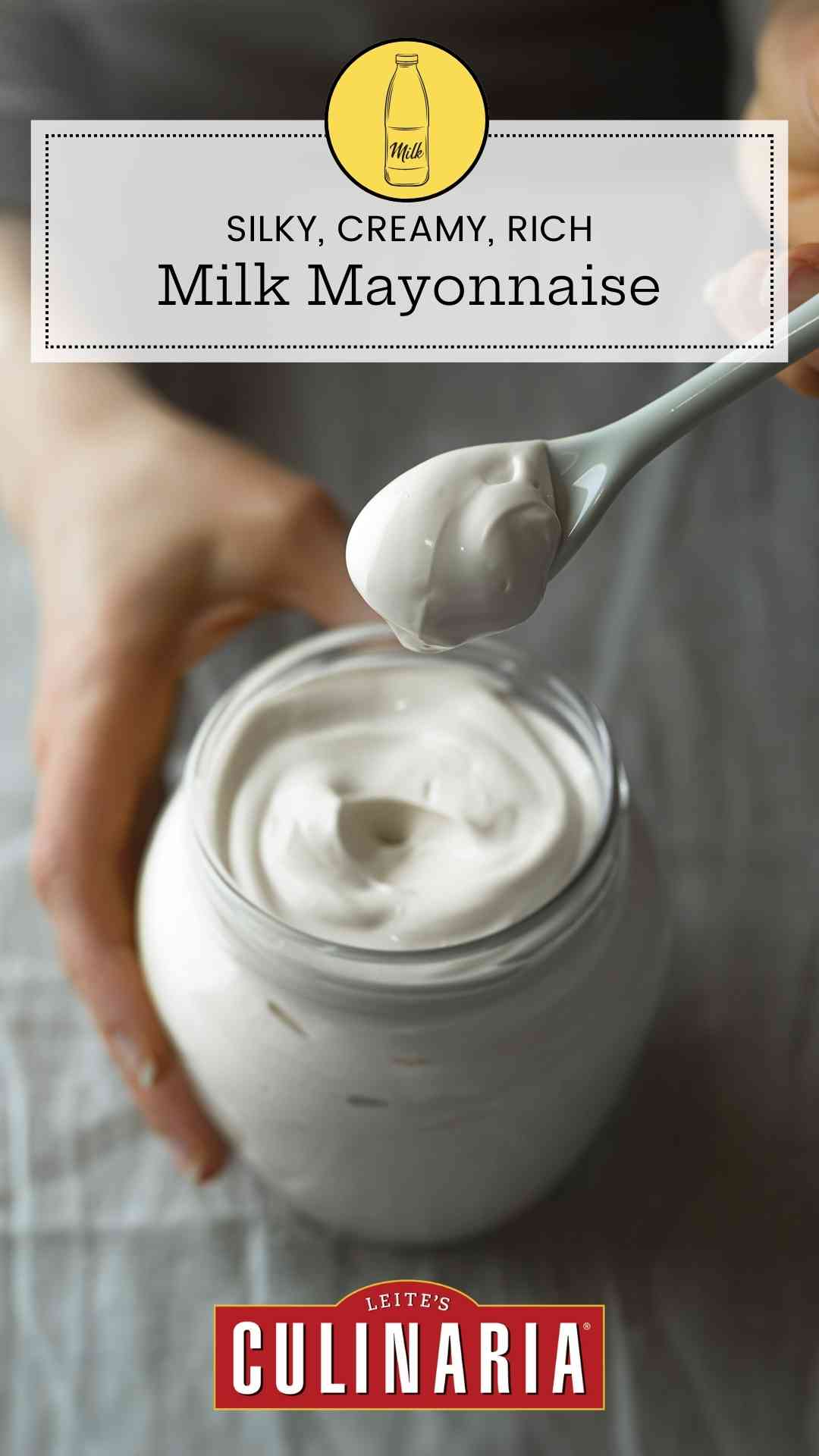










Hi David!
How wonderful that you shared this recipe. I haven’t attempted to make it yet, as I have a question! I have a serious gallbladder problem, so I am stuck on a very strict low-fat/low-cholesterol diet. Lord knows I’d break laws for something “mayo” like to spread on a sandwich,or to add to my tuna. Don’t get me wrong, I love my mustards, balsamics, and oil & vinegars, but I could just scream for something creamy every now & then. I have adapted several kinds of spreads/dips with greek yogurt but they tend to be a bit tangy! Would I be able to use skim milk instead of whole milk in these recipes for the milk mayos? Or is there a lower fat substitute that would work? Love, Love, Love this website! Thank you again!
Pamela, well, first, thank you for the kind words about the website. We love it too, and we love bring to all of you.
About the milk mayo: According to reader Julie Logue-Riordan, it does indeed work with low-fat milk. Not sure about skim milk, though. Some people have had success with rice milk and almond milk, but I’ve never tried them. Please tell us how things turn out.
I like having the benefits of probiotics in my raw sauces and was wondering if using a greek yogurt would be ok or will that affect the flavor?
Hi, Tonya. It definitely would affect the flavor and possibly the texture. You can try it, but it won’t be a milk mayonnaise–but that’s not a bad thing. If you do make it, I’d love to hear your thoughts.
David, we have been struggling through an elimination diet trying to identify food sensitivities. It is like we can’t eat anything normal folks eat. Life without a “mayonnaise” product has been, well. difficult. We cannot have milk products so I tried your recipe using Almond Milk from the health food section of the grocery store. It worked great. We also cannot eat citrus so I substituted tamarind paste for the lemon. (Tamarind is a common souring agent in Southeast Asian cooking.) I also added a 1/2 tsp ground mustard seed for some more flavor. The “mayo” is great. Thanks for the inspiration.
Jon, my heart and palate go out to you. I, too, have suffered through elimination diets. I have also suffered through reincorporating ingredients back into my life, one at a time, waiting to see if there would be a reaction. I laud your tenacity and sense of adventure and look forward to hearing about more of your triumphs…and do check back with us. We often run recipes that just happen to fit in with various dietary constraints without shouting it from the rooftops…